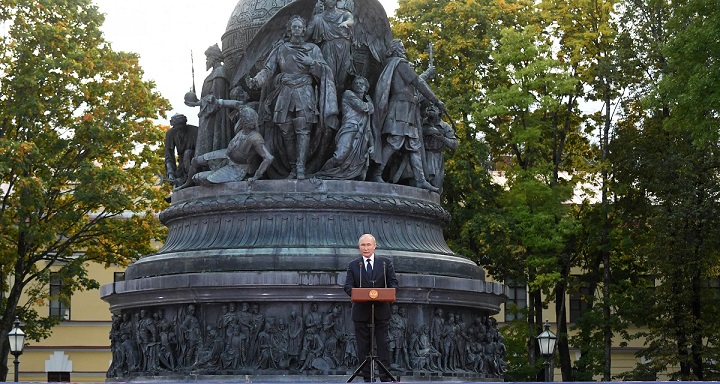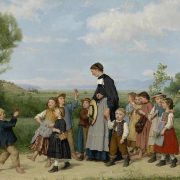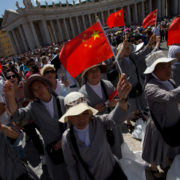
The mobilization announced by Russian President Vladimir Putin on September 21 is not sure to bring a victory from the battered fields of Ukraine. Still, it declares loudly what a growing number of observers have been saying for months: that the “special operation” against Kyiv has failed and that Moscow has been defeated.
Against this defeat, Putin now ups the ante, while the odds are against him far more than on February 24, when he launched the invasion. Military experts argue that recruiting, training, and fielding hundreds of thousands of men will take months, and results are uncertain because new soldiers will be reluctant, scared, and possibly underequipped.
Against them, in seven months, Ukraine built a new army boasting now some 900,000 men and women, well-founded, trained, and determined, although some of them green in battle experience. In traditional theory, Russia should have twice as many men to win against the Ukrainians, but so far, nobody in Moscow speaks openly of sending two million men into Ukraine.
It creates a double hazard for Putin. He has admitted defeat, and gambles on a mobilization that shakes Russian society but comes well short of the necessary goal. Traditionally Russia had no clemency for military losers, and Putin lost by his own admission; plus, he doubled down on his initial gamble without the credit he had at the beginning when he still bet incorrectly. If he lost then, even more so, he should lose now.
The question thus is, will Putin lose alone, or will he take Russia with him? Will he step down or be deposed, or will Russia go from Peter the Great to Vladimir the Small? Peter the Great, Putin’s hero, founded St. Petersburg and started modernizing Russia, projecting it into Europe and Asia, pushing back Mongols and Turks, and showing he was part of the European political and cultural context.
Vladimir Putin, born in St. Petersburg, is being conversely excluded from the West, snubbed in Asia (see the recent brushoffs in Samarkand by China and India), and pushed back by Turkey in the Caucasus. He has reversed all of his hero’s achievements, underpinning four centuries in Russia.
Moreover, Israel and moderate Arab countries considered Russian presence in the Middle east a strategic counterbalance to Iran’s funding of Shiite extremists in the region. Yet if Tehran’s regime is shaken and toppled, as it seems possible with the ongoing wave of protests, Iran could assume a more pro-western leaning and Russian strategic presence could be redundant or counterproductive. That is: Iran’s domestic troubles could hasten Russia’s political and economic isolation.
Then can Russia survive this reversal? It’s uncertain at this point, and the minimal measure is the removal of the first cause: Putin. He may be just a scapegoat for a far more complex situation where no one is without faults, but now his removal is the bare minimum to help Russia survive.
Short of Putin’s “end of time” nuclear threats, beyond any consideration but that of madness, it is very unlikely Russia will turn the tide of war in Ukraine and its massive political fallout. Then Russia should think of salvaging what’s possible, and it could not be too much.
This is a huge lesson for China as well, which seven months ago thought it could have a joyride backing Russia in its Ukrainian adventure. Now, Beijing has politely turned its back on Moscow, ensuring it won’t sink along with Putin. But there is a more powerful lesson to be learned.
Gorbachev’s vendetta
From the vantage point of this defeat, one should rethink all of Gorbachev’s experiences.
Contrary to the official Russian narrative, bought in Beijing, Gorbachev didn’t give in when he could have resisted but made the best of an impossible situation where the USSR was crumbling down to its very last bit, as the astute Anna Zafesova argued.
If Gorbachev hadn’t started his perestroika, the USSR could have fallen apart completely and been ravaged by a cruel civil war. It is so deeply the case that first Yeltsin and later Putin tried to reestablish Russia, patching together haphazardly ill-digested czarist and soviet legacies. The attempt failed because Putin believed his propaganda, forgot the incredibly dire straits of the collapsing USSR, and thought he was Czar Peter’s heir. The Ukrainian invasion now is about to dissolve what little Gorbachev’s salvaged of the soviet legacy, and Putin’s Russia could become a global pariah, like Nazi Germany.
If Gorbachev was right in his analysis of the USSR and might have also been right in addressing the soviet situation, China has plenty of room to rethink its predicament.
Is confrontation with the West the real thing? Is closing down the country the effective answer? Is following the North Korean example of political isolation the real solution?
Russia provides China with the lab experiment for its thesis and questions. Putin’s defeat and Russia’s troubles leave China more alone, more concerned but also with a precious precedent to think of itself and its history in a different light. China could then rethink all its past thirty-three years, from the time it stopped believing in political reforms.
Here, thinking of Gorbachev’s experience, there might also be a lesson for Putin. There is true greatness also in recognizing defeat and an unmanageable situation. In hindsight, Putin might have been in an impossible situation to turn his country around. In 2007, before the Chinese Belt and Road Initiative took off, with Ms. Zafesova[1] we suggested that Russia should become a cultural, economic, and land bridge between Europe and Asia.
Russia had to convert into a full market economy and cut a comprehensive political deal with the US to be that. Perhaps this is still the way, and 15 years ago, Putin had no domestic clout to pursue it.
Yet, short of achieving one’s goal, a politician can still be great in conceding defeat and saving the day and the country. Not everybody can bring victory, but there can be truer heroism in a tragic loss for Vladimir, then the Great.
[1] “Why EU and China Need Russia,” La Stampa 2007, in In the Name of Law.





